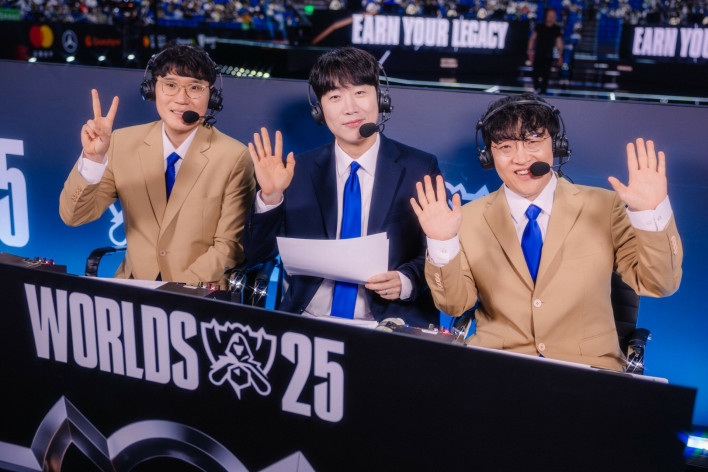
He’s the voice every Korean gamer has heard at least once. From the StarCraft era to the 2025 League of Legends World Championship, plus game shows, the UFC, and more—Seong "SEONG K" Seung-heon is the consummate play-by-play caster who’s stayed active across every stage.
Back in a 2018 interview, Seong said, “A goinmul (stagnant old-timer) isn’t someone who’s been around a long time—it’s someone who refuses to change,” underscoring his refusal to get complacent and his commitment to constant improvement. Seven years later in Shanghai, we found him the same—always leveling up—still a voice that makes our ears smile.
It’s been seven years since 2018. How have you been? Please say hi to the fans.
I’ve been working hard across a really wide range of fields. In addition to the LCK and the UFC, I recently called the FIFA U-20 World Cup, too. I’d be grateful for your continued interest and support going forward.
You recently called LCK matches on MBC as well. How did that differ from your usual broadcasts?
Thankfully, having already done the Asian Games, prepping for it wasn’t difficult. The colleagues I worked with were ready as well. The big question was how to communicate effectively to relatively light viewers. Because it was a multi-game series, I tried to make Game 1 as friendly as possible from a beginner’s perspective, then gradually ramp the tempo back to my usual pace as the series went on.
Worlds is in Shanghai this year. What’s the vibe like?
I’ve been to Shanghai quite a few times. My earlier memories were of a big, somewhat cold metropolis. But I also had a great experience in Chengdu during MSI, and thanks to LoL I’ve come to have a very positive impression of China. It’s the same here now. You see Worlds videos everywhere, there are pop-up stores—it feels a bit like Where’s Waldo?, like you’re constantly stumbling on something to find.
You’ve stayed at the top of your field for a long time, and you’re active beyond esports, too. As the years add up, what’s changed—especially in terms of mindset?
What fans want keeps changing with the times. Even if you feel you’ve achieved a certain level of completeness, that inevitably shifts. No matter the broadcast, you can’t coast—you have to put in the work. And what keeps me on my toes even more than criticism is fans’ praise.
When fans compliment me, I wonder if they’re spending just as much energy on me. I believe it’s my duty to repay that precious energy by always working hard and giving my very best.
We heard you recently called the FIFA U-20 World Cup.
It was a genuinely new approach for me, and it looks like I’ll be continuing to work with JTBC. Outside of the EA Sports FC Online league—and apart from the prep I did at the very start of my TV career—it had been a long time since I called real football. It reminded me all over again how fun broadcasting is. I’ve been doing play-by-play for years, but when you tackle a different field you meet a different audience. And game fans really gave me a ton of support.
Is there another area you’re eager to try?
Preparing for the U-20 World Cup, I went in with the mindset of a high-school senior taking the college entrance exam. I searched out the players’ high-school matches, dug deep into the K3 League—really researched a lot. Taking on something new is never easy. It’s not just “go on air and you’re done”—you have to know enough that viewers can feel you did the work and that you mean it. That’s hard.
Personally, I’d like to try a survival or reality program. I once did play-by-play for Physical: 100, but the show’s direction shifted later in production and we couldn’t make it shine. Still, there’s I Am Boxer coming soon on Disney+, and I’ll be on the call for that.
You’ve been in the game a long time, but your job puts you face-to-face with new generations all the time. As you encounter the so-called “MZ generation,” what do you do to understand their culture and trends as much as possible?
One of the most important elements of a broadcast is empathy. I heard something about parenting once: when kids are little, you have to be strict, but as they grow, empathy becomes more important. Empathy with the audience has to come first—only then will they follow what you say. So I continually check what younger generations like and what brings them joy.
A final message for the fans?
I’m always thirsty for what’s new. Even in fields I’ve worked in for years, there are new narratives and new forms of broadcast. There may be mistakes along the way, but if I keep at it, I believe I can get closer to the level of completeness the fans want.
This article was translated from the original that appeared on INVEN.
![]()
- Hongje "Koer" Kim
- Email : koer@inven.co.kr

Sort by:
Comments :0